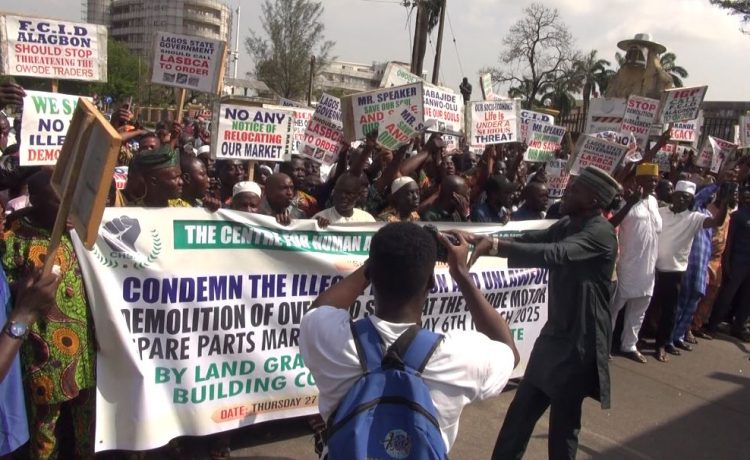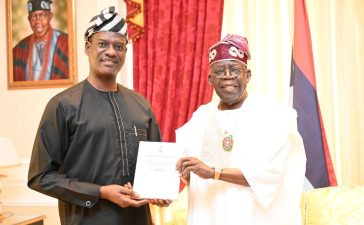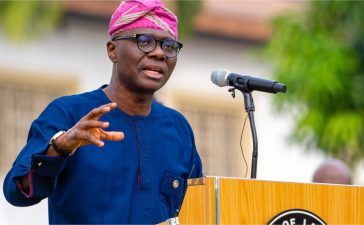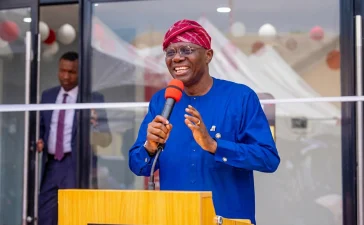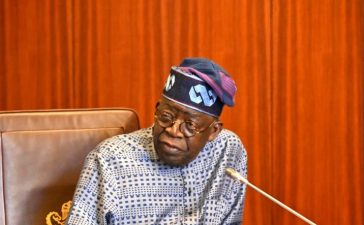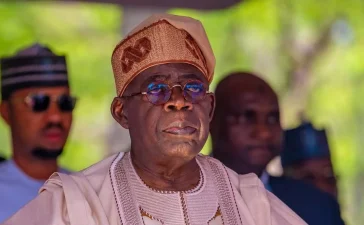Traders and members of the Centre for Human and Socio-Economic Rights (CHSR) staged a protest at the Lagos State Government House in Alausa on Thursday, demanding justice over the unlawful demolition of over 500 shops at Owode Motor Spare Parts Market.
The protesters gathered to demand accountability for the illegal destruction of their market and the restoration of their livelihoods, which were abruptly and violently disrupted.
The demonstrators called for the immediate arrest and prosecution of all individuals involved in the planning and execution of the demolition, including security agencies and thugs who allegedly carried out acts of violence and unlawful arrests.
Early Morning Demolition
Eyewitnesses say that the demolition occurred in the early hours of the morning, around 4:30 a.m., when many traders were still asleep or had not yet arrived at their shops. The operation was allegedly carried out by officials from the Lagos State Building Control Agency (LASBCA), accompanied by police officers and suspected armed thugs.
According to the traders and several onlookers, the demolition was linked to the enforcement of a legal judgment concerning the neighboring Agbajoowo Market. However, the traders from Owode Motor Spare Parts Market contended that their market was not included in any legal ruling. They expressed frustration over being caught up in what they deemed an arbitrary and unjust action.
History of the Owode Market
The Owode Motor Spare Parts Market has been a key international trading hub for over four decades. The market, which specializes in the sale of automobile parts, tools, and accessories, was relocated to its current site on Ikorodu Road during the tenure of the late Governor Lateef Jakande in the early 1980s.
Also, the market has remained an essential part of Lagos’s economy, contributing to both local and international trade. Many traders rely on the market as their primary source of income, with some families having operated businesses there for generations. The unlawful demolition of their shops has left hundreds of traders without a means to support themselves or their families.
Human Rights Violations
The protesters argue that the demolition was not only an act of economic injustice but also a violation of human rights. According to human rights advocates, the actions of the LASBCA officials, police officers, and armed thugs were heavy-handed and illegal.
Numerous accounts from traders and market vendors claimed that they were subjected to violence and unlawful arrests during the demolition. Many said they were physically assaulted, their properties damaged, and their livelihoods destroyed—all without prior notice or legal process.
The traders assert that the operation was carried out without regard for due process, as they had not been formally informed about any legal decisions that could lead to the demolition of their shops.
Calls for Justice
The Centre for Human and Socio-Economic Rights (CHSR), a prominent human rights organization, condemned the demolition as an egregious violation of the traders’ rights.
The organization called for the immediate arrest and prosecution of all those involved in the demolition, including both the government officials and the alleged thugs who had been sent to enforce the action.
The CHSR further demanded that the Lagos State Government compensate the traders for their losses and provide restitution for the destruction of their businesses.
They also expressed concern that this incident was part of a broader pattern of illegal demolitions and forced evictions, which disproportionately affect economically disadvantaged and vulnerable populations in Lagos.
Broader Concerns and Impact
The protestors emphasized that the demolition was not just a localized issue, but one that highlights broader concerns about governance in Lagos State.
They raised issues such as the lack of transparency in government actions, the absence of clear communication with affected communities, and the disregard for the socio-economic impact on the traders and their families.
Many protestors also decried the failure of the state government to provide adequate alternatives for those whose livelihoods had been disrupted by the demolition.
The traders vowed to continue protesting until their demands for justice and restoration were met, expressing hope that the attention garnered by the demonstration would lead to positive change.
Devastation for Traders
The impact of the demolition has been devastating for the traders. Many of them are now left without a market to operate in and have limited options to recoup their losses.
Some traders have resorted to setting up makeshift stalls on the side of the road or in other less viable areas. However, the destruction has caused a significant reduction in foot traffic, making it harder for them to sustain their businesses.
The traders, now facing immense financial hardship, are seeking justice not only for the destruction of their market but also for the restoration of their livelihoods.
The Path Forward
The fate of the Owode Motor Spare Parts Market is uncertain, and the full extent of the damage is still unfolding. It remains to be seen how the Lagos State Government will respond to the growing public outcry.
The traders and their supporters are determined to continue pushing for justice. They seek not only to restore their market but also to prevent future injustices against vulnerable communities in Lagos.
The Owode Motor Spare Parts Market has long been a vital part of Lagos’s economy, and its traders are hopeful that their fight for justice will lead to positive changes in the way the government engages with local businesses and communities.

